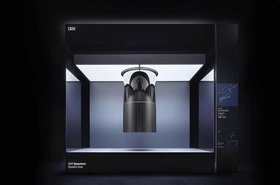The High-Performance Computing and Quantum Simulator (HPCQS) project has inaugurated two Pasqal quantum processors at Germany’s Jülich Supercomputing Centre (JSC) at Forschungszentrum Jülich (FZJ) and the French Alternative Energies and Atomic Energy Commission (CEA).
The neutral atom quantum computers, dubbed Ruby and Jade, will be integrated into high-performance computing (HPC) environments to support applications such as drug discovery and industrial battery design.
Launched in December 2021, the HPCQS initiative aims to advance the integration of quantum systems with the European supercomputing infrastructure. Supported by the EuroHPC Joint Undertaking and six European countries – Austria, France, Germany, Ireland, Italy, and Spain- it operates with a budget of €12 million ($14m), half of which is funded by the EuroHPC JU.
In a statement, HPCQS said the deployment represents a “key step towards a federated EuroHPC quantum-HPC infrastructure.”
The first HPCQS quantum computer was delivered to the French supercomputing center GENCI/CEA in August 2024, to be integrated with the Joliot Curie system. In September of that same year, DCD exclusively reported that GENCI is set to retire its Joliot-Curie supercomputer once its Alice Recoque exascale machine comes online.
“Today marks an important milestone for European research,” said Kristel Michielsen, director of the Jülich Supercomputing Centre and HPCQS project coordinator. “We are entering a new phase in which quantum and classical computing begin to evolve together. This is more than a technical achievement – it signals a new paradigm for computation, one that will shape the future of scientific discovery.”
Bruno Lebret, director of CEA, added: “The CEA is very proud to host one of the first two Pasqal computers delivered and operated in an HPC computing centre. With this milestone, TGCC users and European scientific communities will be able, after three years of experiments with emulators, to use real quantum computers for their use cases. This is a first step on the road to large-scale hybrid computing, which we will achieve with quantum processors integrated with the Alice Recoque exascale supercomputer.”
Founded in 2019, Pasqal said its ‘neutral atom-based quantum technology’ can operate at room temperature, unlike other quantum technologies that require supercooling. The quantum processing units (QPUs) for the Ruby and Jade systems were prefabricated by Pasqal before being shipped to the data centers of CEA and FZJ.
In June 2025, the startup announced it had sold a 100-qubit quantum processing unit (QPU) to Distriq, a ‘Quantum Innovation Zone’ based in Sherbrooke, Canada, and had also opened a manufacturing facility in the same city.
Earlier this month, LG Electronics said it would invest in the French quantum startup, with the company simultaneously announcing plans to expand into South Korea with a $52 million commitment.
Otus supercomputer installed at Paderborn University
Also in Germany this week, Paderborn University has installed a supercomputer at its Center for Parallel Computing (PC2).
First announced in February 2024, the system, named Otus, is the successor to Paderborn’s existing Noctua 2 supercomputer, also housed at PC2.
Otus was developed by Lenovo and Datensysteme, and is comprised of 142,656 processor cores, primarily fifth-generation Turin Epyc processors from AMD, and 108 Nvidia H100 GPUs. The cluster also features 5PB of storage managed with IBM Spectrum Scale file system. The system currently ranks fifth on the Green500 list of the world’s most efficient supercomputers.
Expected to have a run time of at least five years, a significant portion of the computing system will be made available to researchers across the country as part of an agreement with the National High-Performance Computing (NHR) Alliance. It was funded in equal parts by the state of North Rhine-Westphalia and Germany’s federal government, for a total cost of about €14 million ($16m).
“High-performance computing is hugely relevant to the pressing challenges of our time,” said Paderborn University’s president, Professor Matthias Bauer.
“Researchers can use supercomputers to trawl through huge quantities of data within a short period of time and identify patterns. Experiments that would be extremely expensive, dangerous, or quite simply impossible can be simulated. As a result, this also allows us to make predictions about potential future developments. I am delighted that here in Paderborn, we have access to state-of-the-art, world-class infrastructure in this area thanks to PC2 and Otus.”
Read the orginal article: https://www.datacenterdynamics.com/en/news/pasqal-delivers-two-neutral-atom-quantum-computers-to-jsc-and-cea/









